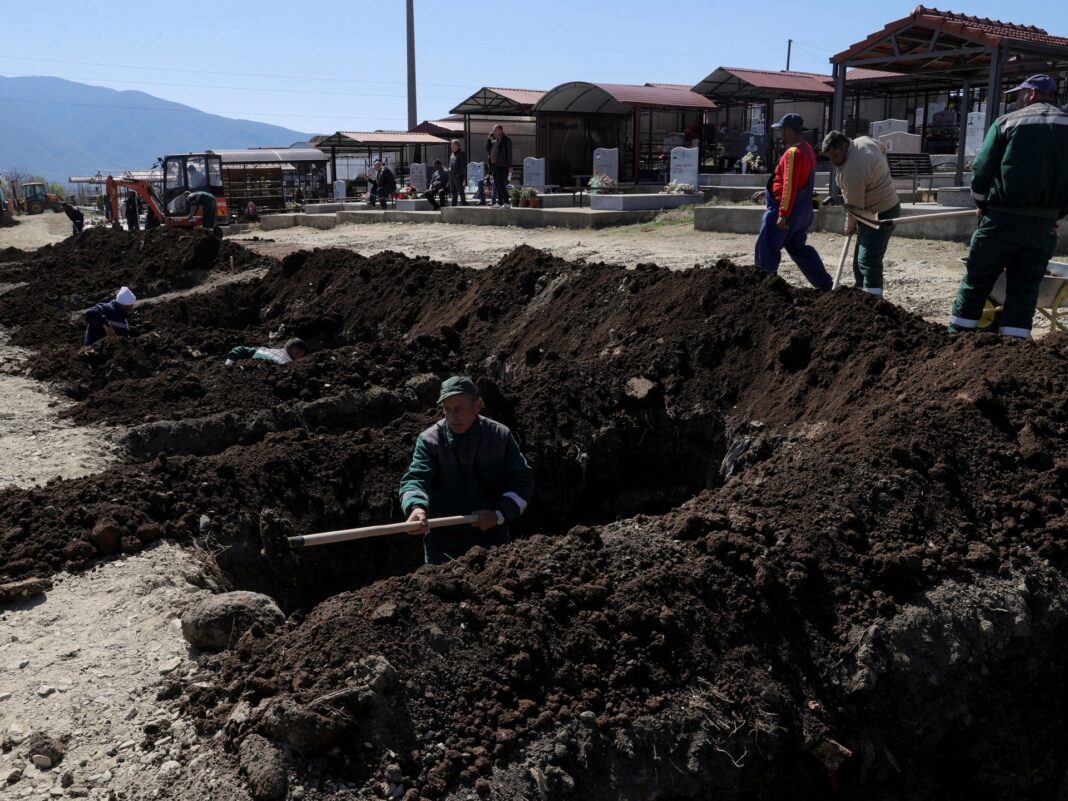On March 16, a fire tore through an improvised nightclub inside an abandoned carpet factory in Kocani, North Macedonia, killing 59 young people and injuring more than 150.
In Kocani, a town of fewer than 25,000 people, the loss is profound – a large part of its youth died in the fire. Like many towns across North Macedonia, it had already been hollowed out by migration. For those young people who stayed, the fire was a devastating reminder of the shrinking possibilities for life at home.
The tragedy prompted national mourning and outrage. Students organised protests and vigils, lighting candles and holding placards that read: “In war, not as many people die as they do in this cheap, rotten peace” and “Either we migrate, or we burn alive.”
These messages speak to something deeper than this single incident – they reflect a widespread discontent that has been building up for years. Tragedies in North Macedonia are frequent, systemic, and inevitable – the result of governance that prioritises the interests of the powerful over the safety and well-being of the general population.
It is easy to blame this flawed governance on a corrupt local elite, but what is happening in North Macedonia and other Balkan countries goes far beyond that.
Corruption and dependence
The term “corruption” is often used to describe political and economic dysfunction in the Balkans, but more often than not, it obscures more than it explains. Corruption, in the eyes of the European Union – the dominant power in the Balkans – is frequently framed as a regional pathology, rather than a structural condition.
Yet, it is not only deeply embedded in Macedonian institutions, but also in North Macedonia’s relationship with the EU.
For decades, the EU has promised that its accession process would modernise countries in the Balkans – bringing democracy, rule of law, and economic opportunity. In reality, however, candidate countries remain trapped in a perpetual state of transition: Never “ready” for membership, yet increasingly subjected to external influence.
In this way, rather than building resilient democracies, the EU accession process is empowering compliant elites, feeding the expansion of clientelistic networks, and locking Balkan governments into compliance with EU interests and policies.
In places like Kocani, these dynamics are more than apparent. Despite the EU pouring millions into programmes like the Instrument for Pre-Accession Assistance in Rural Development (IPARD), small towns and rural areas in North Macedonia remain economically stagnant, offering few opportunities for young people.
These funds do not stimulate local economies. Instead, they are siphoned off by local power networks that maintain political control over rural areas and certain sectors of the economy.
EU funds also often end up flowing into companies, consultancy firms, international organisations, and NGOs with ties to Brussels. These actors influence funding priorities to serve their own interests, deepening dependency rather than fostering self-sustaining local development.
The lack of development and economic opportunities has led to massive emigration that has had a disastrous effect across various public spheres and economic sectors. This is also visible in Kocani. When the tragedy struck, local hospitals could not handle the large influx of injured people and dozens of victims had to be transported to neighbouring countries for emergency treatment.
That is a direct consequence of years of outflow of labour incentivised by developed EU member states, which constitutes a form of extractivism. A significant number of healthcare professionals have left the country for better opportunities in the West. We have now reached a point where recruitment agencies target medical and nursing students, offering them jobs in hospitals in Western Europe even before they finish their education – paid for with Macedonian taxpayers’ money.
As a result, hospitals in towns like Kocani and even in the capital, Skopje, face severe staff shortages. The staff that remain are overburdened, leading to a decline in the quality of care and a compromised ability to handle emergencies.
This exodus of workers not only undermines healthcare services but also exacerbates shortages in other critical sectors such as construction and agriculture, weakening the economy, stifling innovation, and creating a cycle of decline that is difficult to reverse.
Extractivism and control
Elsewhere in the Balkans, the extractivist policies of the EU are even more apparent. In 2024, the EU adopted the Critical Raw Materials Act (CRMA), which aims to ensure the bloc’s independence for supply chains of critical minerals. Under this framework, Brussels is eyeing the Balkans as a key supplier for its so-called “green transition”.
Lithium and copper, among other minerals deemed essential for EU industries, are being prospected across the Balkans, reinforcing the region’s role as a resource extraction zone.
In Serbia’s Jadar Valley, the controversial Rio Tinto lithium mining project – backed by the EU and Serbian President Aleksandar Vucic – threatens to destroy ecosystems, displace communities, and pollute vital water sources. The project has been met with massive public opposition, prompting nationwide protests and becoming a powerful symbol of resistance against extractivism and government complicity.
Another such case, a proposed lithium mining project in Bosnia’s Lopare region, led by Swiss company Arcore AG and supported by Milorad Dodik, the president of the entity Republika Srpska, where it is located, has also generated strong resistance due to similar environmental concerns. These projects, marketed as sustainable development, mirror colonial extraction practices: Profits flow to foreign investors, while local communities bear the environmental and social costs.
The support of these projects by local officials has led to frustration across the region as people feel increasingly alienated from the political process. In Serbia, this frustration exploded after the deadly collapse of Novi Sad’s railway station canopy, which killed 16 people. The incident prompted some of the largest protests in the country’s history, led by students demanding accountability and an end to government misrule.
While the EU has been vocal in its support of similar antigovernment protests elsewhere, such as in Georgia in 2024, it has remained notably silent on the protests in Serbia. This may have to do with the fact that these demonstrations are against political elites with repressive tendencies that benefit from EU funding and serve EU interests.
The protests in Serbia revealed another dangerous dynamic: Local police forces supported by the EU turning on the local population.
On March 15, Serbian protesters alleged that authorities used a sound cannon to disrupt a 15-minute silence held in memory of the Novi Sad victims in Belgrade. Local media outlet BIRN reported that similar devices were previously suspected of being used on asylum seekers during forced evictions.
The Serbian police force, just like the security forces of other Balkan countries, has been supported, trained and supplied with millions of euros’ worth of surveillance and other policing equipment by the EU to contain migration flows towards EU borders.
Local as well as EU police forces have been repeatedly implicated in violent pushbacks and illegal detentions of asylum seekers. It is only a matter of time before technologies and practices meant for migrants are deployed against citizens protesting their governments.
A bleak future
The convergence of extraction, repression, and border militarisation in the Balkans is no accident. It is the logical outcome of an EU integration model designed to prioritise European capital and geopolitical interests over the lives and futures of people in the region – people it deems largely expendable.
And what is unfolding must be recognised for what it is: Not a byproduct of slow reforms but of a system of imperial governance. The goal is not to build resilient, autonomous democracies in the Balkans. Instead, it is to create compliant states that can be easily coerced to serve the EU’s political and economic interests.
Young people across the region are increasingly aware of this reality. Many no longer see the EU as a solution to their problems, but as part of the problem itself. While declining support for EU accession is often misread as a resurgence of nationalism or right-wing Euroscepticism, the answer is in fact far simpler: For many, it reflects the growing recognition that EU integration has failed to deliver security, dignity or prosperity. Instead, it has only deepened subjugation.
The nightclub fire in Kocani was not just a terrible tragedy – it was the inevitable result of a system that has long abandoned the people of North Macedonia.
The views expressed in this article are the author’s own and do not necessarily reflect Al Jazeera’s editorial stance.


